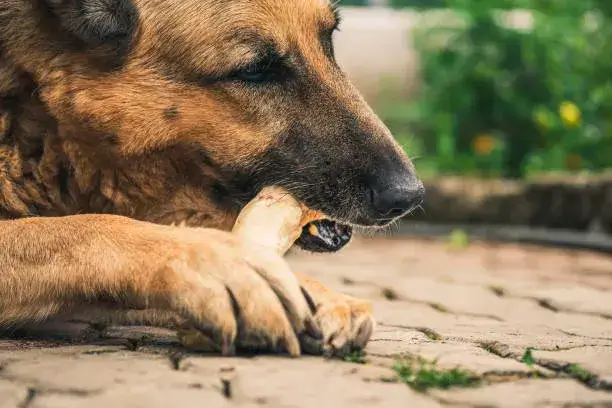Just as their food is a prize, so is a bone. When your dog is chewing on their bone, they absolutely love it. If you take it away, they will feel negative emotions and assume it is a punishment of some kind. This action is called resource guarding.
Does giving a dog a bone make them aggressive?
Does your dog exhibit aggressive behavior when he has a bone or toy? This issue is called Resource Guarding and if not addressed, can escalate into dangerous behaviors like biting. From an evolutionary standpoint, dogs developed this behavior for obvious reasons.
What happens when you give a dog a bone?
Bones are a good source of minerals and other nutrients and help satisfy your dog’s appetite. Chewing stimulates saliva enzymes and helps prevent plaque buildup on teeth and gum disease. And a dog chewing on a bone is less inclined to excessively scratch or lick their paws.
Why you shouldn’t give a dog a bone?
Pieces of bone can lodge in the esophagus on the way down to the stomach. Sharp bone shards can penetrate the soft tissues at the back of the throat or pierce the esophagus. It is also possible for a piece of bone to get into the trachea (windpipe), interfering with your dog’s ability to breathe.
Is eating a bone mental stimulation for dogs?
Unlike physical stimulation that a run would provide, chewing gives dogs a mental stimulation. The act of chewing on a bone or working to get treats out of a toy keeps her mind busy and her taste buds happy. When dogs are puppies they chew to help them explore the world.
Why do dogs get so defensive with bones?
It is quite normal for dogs to be protective over things they see as a valued resource, such as food, bones and other people. Often, this is the result of a previous experience which dictates to the dog that, if a person or other animal approaches it when it has these resources, they will be taken away.
Why does my dog try to bite me when I took his bone?
Canine possession aggression is also sometimes referred to as “food aggression” or “resource guarding.” If your dog has this problem, it may growl, snap, or bite to protect a resource, such as food, toys, beds, or other objects, from being taken away by another dog or person.
Is it OK to give a dog a bone everyday?
Too many bones may lead to constipation. The general guideline is one to two raw bones per week with a few days in between each serving, but this may vary between individual dogs so talk to your vet for advice. Speak to your vet about your dog’s nutrition.
Do vets recommend bones for dogs?
It might be your pup’s favourite treat, but vets are warning that bones can be dangerous for dogs. Yep, while they may enjoy chewing and playing with them, the fun treat can cause splinters and internal damage. Additionally, pieces of bone can damage dogs’ digestive systems.
What is the safest bone to give a dog?
Raw bones are considered safer than home-cooked because they don’t splinter as easily. Raw bones like chicken, turkey, lamb, beef, or even oxtail can be safer bone options for your pet. Unlike home-cooked bones which are drained of their nutrients, raw bones can be a natural source of calcium and phosphorus.
Why does my dog run away when I give him a bone?
It’s your dog’s instinct to seek privacy to enjoy the high value resource and not have to share. He might feel he needs to keep it where he thinks no other members of the pack will see it.
How long should I let my dog play with a bone?
Set a time limit — Allow your dog to chew for no more than 10 to 15 minutes at a time. Propose a trade — Offer your dog a tasty treat in exchange for their chew. Toss the new treat to encourage them to drop the chew. Reaching directly for a chew may cause a dog to bite or gulp their treat.
Why does my dog growl when I give him a bone?
This behavior is called resource guarding, and it is simply a way for dogs to communicate that they are not done with the bone yet. If you try to take away a bone from a dog while they are still interested in it, they may growl to tell you they don’t want to give it up.
Should you leave a dog alone with a bone?
Bones should only be given to dogs under supervision, and they should never be left alone with them. bones should never be given in small chunks as they could be swallowed. cooked bones should never be given to dogs. bones should be almost as big as your dog’s head.

